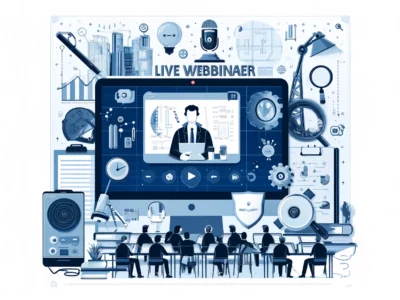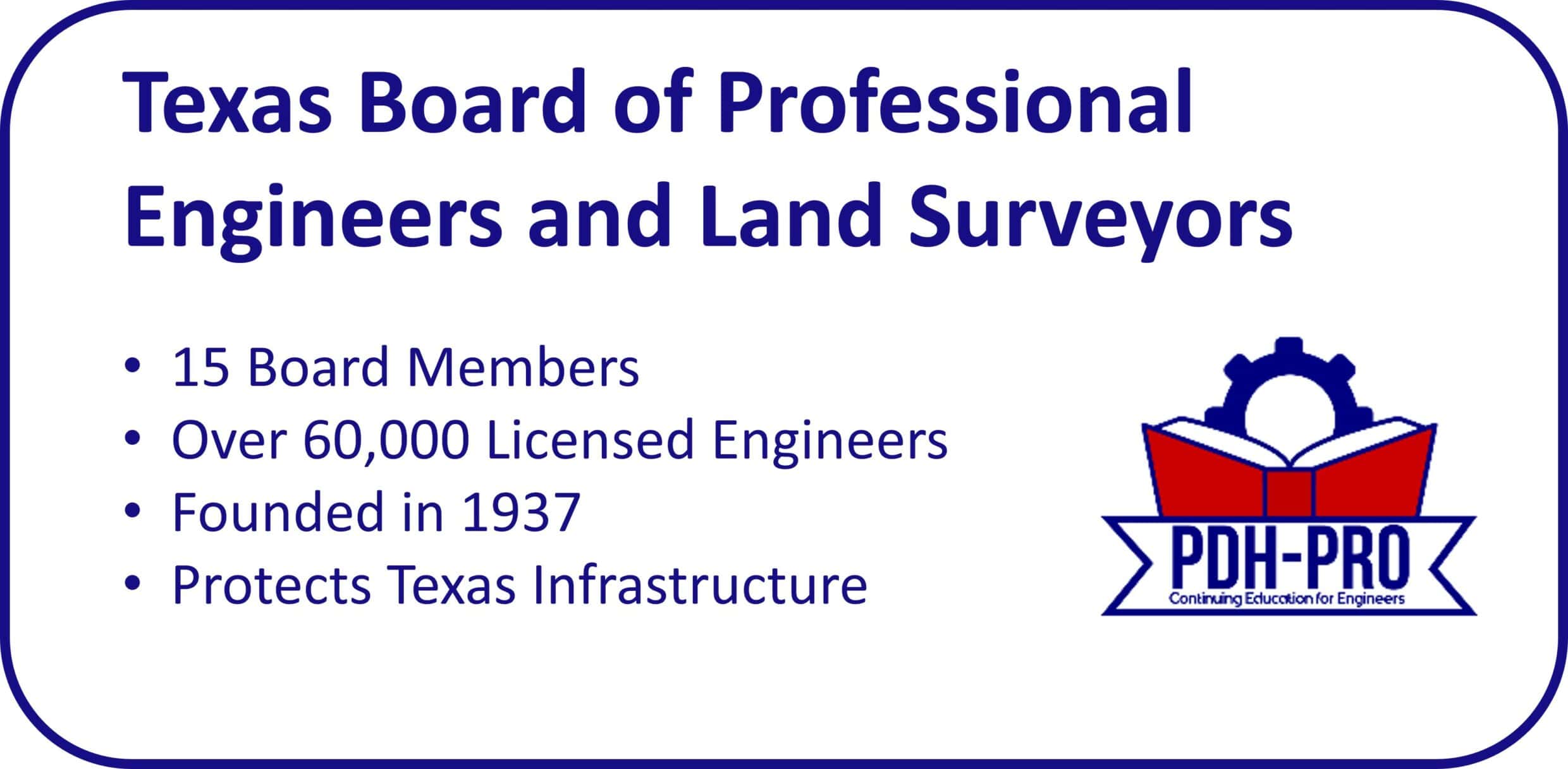CEU Requirements for Texas Professional Engineers
 If you are a Texas PE renewing your license, you’re probably wondering – What are the continuing education requirement for Texas professional engineers?
If you are a Texas PE renewing your license, you’re probably wondering – What are the continuing education requirement for Texas professional engineers?
Texas engineers must earn 15 hours of professional development hours (PDH) annually. At least one hour must be related to ethics. The Texas Board allows each engineer to determine whether a continuing education activity is suitable as long as it is related to engineering.
Texas Engineers can earn PDH credits by taking online continuing ed courses, attending conferences and seminars, participating in live webinars, and completing self-directed activities.
It is important for professional engineers to understand that each licensee is responsible for determining which continuing ed courses are suitable for license renewal and for maintaining records of CEU activities. If your license is inactive (you must apply for this status), you are disabled, or you are a deployed military service member you do not need to obtain continuing education credits.
For a complete list of all license renewal requirements check out our Texas PE renewal page.
Texas PDH Credits
The Texas Engineering board requires every professional engineer to renew his or her license annually. Each engineer must complete the following continuing education activities each year:
- 15 PDH hours (educational, technical, ethical, or managerial content)
- 1 hour of ethics courses
The renewal process in Texas is done electronically. The TBPE does not require submission of certificates of completion from continuing education courses. Professional engineers are expected to keep copies of these documents in the event of an audit.
Texas License Renewal Dates
Every PE in the state of Texas must renew his/her license annually. Licenses are renewed on March 31st, June 30th, September 30th and December 31st based on the original date of licensure. The PE license renewal process in Texas can be done completely online now. Documenting your continuing education hours requires certifying that you have completed 15 hours of engineering CEUs. Make certain to renew your license before the deadline because Texas, like every other state, will sanction you for practicing engineering without a valid license if you let it expire. There are dozens of disciplinary actions handed out by the Texas Board every year for what is essentially an administrative oversight. To add insult to injury, if you are licensed in more than one state, this disciplinary violation must be reported to the other state engineering board, or you run the risk of receiving another ethics violation for failing to notify them in a timely manner.
Engineering Ethics and Professional Conduct
Texas requires professional engineers to obtain 15 hours of continuing education training every year, with at least one hour of ethics courses. The definition of ethics is broadly interpreted by the Texas Board. Engineering ethics means an activity that addresses Texas engineering laws and rules, the Texas Engineering Practice Act, the Texas Board Rules, and case studies that address ethics and professional behavior. The Texas Board of Professional Engineers offers free ethics courses on a quarterly basis which is a great way to meet the engineering ethics requirements for license renewal while also saving some money. A lot of continuing education providers offer engineering ethics courses that can meet the ethics training requirements.
Ethics is an important continuing education topic for professional engineers because they are responsible for protecting the public safety and maintaining the public’s trust in the profession. As a result, every engineer must understand the requirements of ethical behavior and professional conduct and hold themselves to this ideal. To maintain the integrity of the profession of engineering, the Texas board requires engineers to complete at least one hour of PDH credits in ethics. The TBPE also provides free webinars on ethics to make it easier for engineers to satisfy this continuing education requirement every year.
Records Keeping Requirements for Engineers
The TBPE requires every professional engineer to maintain records of their CEP hours for three years. Documentation of PDH credits is not submitted during the renewal process, but the board may elect to audit an engineer. Most courses provide students with a certificate of completion to document participating in an engineering continuing education activity. It is important that you have these records readily available because timely submission of CEU documentation is required by statute. Either paper records or electronic files may be used to prove compliance with the Texas continuing education requirements. Most continuing ed providers offer certificates of completion that meet the Texas Board requirements and almost all keep records for the minimum time required.
Continuing Education Activities Accepted by the Texas Board
The Board accepts a variety of activities for the 15-hours of CEU each year. TBPE rule 137.17(f) requires that continuing ed must be relevant to the practice of a technical profession and may include educational, technical, ethical, or managerial content to count. In general, the training course must be related to engineering in an education, technical, managerial, or ethical manner. The TBPE accepts online courses, live webinars, pre-recorded webinars, on-demand webinars, conference presentations, and college courses. The Board provides free online ethics webinars that meet the Texas engineering ethics requirements. In addition, licensees are allowed a maximum of 5 PDHs for self-study activities.
Online Courses: Engineers may take any number of online courses to satisfy the CEU requirements in Texas. The Board has noted that there are no limits for internet based continuing ed classes, and professional engineers can participate as long as the courses are related to engineering and meet the other requirements. More than 78% of Texas professional engineers say they fulfill most of their PDH requirements using online courses.
 Live Webinars: Webinars are similar to classroom presentations but do not require students to travel for participation. Classes are led by an instructor, usually a PE or subject matter expert, using a webinar platform like GoToMeeting or Skype. Live webinars are accepted by the Texas Board for continuing education PDH credits as long as they meet the general guidelines for continuing education courses. Many engineers prefer this type of training because they allow students to interact with the instructor and other participants which provides for a more engaging and interesting activity.
Live Webinars: Webinars are similar to classroom presentations but do not require students to travel for participation. Classes are led by an instructor, usually a PE or subject matter expert, using a webinar platform like GoToMeeting or Skype. Live webinars are accepted by the Texas Board for continuing education PDH credits as long as they meet the general guidelines for continuing education courses. Many engineers prefer this type of training because they allow students to interact with the instructor and other participants which provides for a more engaging and interesting activity.
Self-Study Courses: Texas is unique in this regard because they allow professional engineers to complete self-study activities as part of the required continuing education activities. The TBPE allows up to 5 PDH hours each year in this category and has a form for reporting self-study activities. One type of self-study activity that is allowed is to watch videos of the Board meetings. These are posted on the board website and some continuing education providers offer self-directed courses that can be used to meet the continuing education requirements for Texas.
Check out this video.
Videos of TBE Meetings Count Towards CEU credits [28:40]
Seminars: Many engineers prefer to attend live training events to earn their continuing education requirements. This format includes technical conference presentations, college courses, special seminars hosted by continuing ed providers, and meetings with engineering societies. Seminars offer a high value learning environment for professional engineers and almost every state board accepts CEU hours from this educational format.
Which Continuing Education Activities Count?
The Texas Board provides two criteria to help professional engineers determine whether or not a continuing ed activity will count. The first standard asks if the specific activity is identified in the Board Rules. This includes things like completing or auditing a college course, taking an online PDH course, presenting at a conference, teaching a course, authoring a technical paper, or obtaining a patent. The second criteria requires that the activity must be relevant to the practice of a technical profession and include technical, ethical, or managerial content. In short, if the activity is related to engineering in a technical, managerial, or ethical manner, then it will count towards the Texas continuing education requirements for license renewal.
Pre-Approval of Continuing Education Activities
The Texas Board of Professional Engineers states that they do not pre-approve continuing ed courses or course providers. Each engineer must decide for himself if an activity meets the Texas continuing education requirements or not. The engineering board has established guidelines and rules for evaluating specific courses, but they will not review courses or course providers in advance. The position of the TBPE is is relatively standard across the country – only six states pre-approve continuing education providers.
Sources of Free Continuing Education Courses
Texas professional engineers looking to meet their continuing ed requirements have several free courses available to them. The Texas Board of Professional Engineers provides free engineering webinars on ethics every quarter. These free courses are usually scheduled one month before license renewals. Another good source of free continuing education courses for engineers are recorded TBPE meetings. By watching the meetings on YouTube, professional engineers can earn as much as 5 hours of CEU credit each year. It is important that you document this self-study activity using the TBPE forms.
Texas Engineering Licensing
Engineering licensing requirements vary by state, but, in general, PEs must have a four-year degree from an ABET accredited program in their discipline, pass a national examination, and have sufficient professional experience under the supervision of a licensed engineer (usually 4 years or more). Not all engineers are licensed and many do not need to be Professional Engineers. However, to operate an engineering firm or to claim that one is an “engineer”, professional registration as a PE is required. The TBPE mission is to protect the health, safety and welfare of the people of Texas, and continuing education is one way they protect the public and maintain the high standards of engineering in Texas. The State of Texas follows the NCEES guidelines for licensing professional engineers.
Read our article about how to become a structural engineer in Texas.
All-In-One Engineering Packages for Texas
 Keeping track of the ever-changing continuing education requirements for Texas can be challenging. PDH-Pro has a team of experts who monitor the license renewal requirements for Texas to ensure our courses and curriculum meet the requirements of the TBPE. In 2016 we introduced our Texas Engineering Packages to provide professional engineers with a simple and convenient way to renew their license and meet the continuing ed requirements established by the Texas engineering board. These packages are aligned by engineering discipline – chemical, civil, electrical, environmental, geotechnical, mechanical, and structural, and allow Texas professional engineers to focus on their careers rather than CEU requirements.
Keeping track of the ever-changing continuing education requirements for Texas can be challenging. PDH-Pro has a team of experts who monitor the license renewal requirements for Texas to ensure our courses and curriculum meet the requirements of the TBPE. In 2016 we introduced our Texas Engineering Packages to provide professional engineers with a simple and convenient way to renew their license and meet the continuing ed requirements established by the Texas engineering board. These packages are aligned by engineering discipline – chemical, civil, electrical, environmental, geotechnical, mechanical, and structural, and allow Texas professional engineers to focus on their careers rather than CEU requirements.
Engineering Discipline Restrictions
Texas does not license professional engineers by engineering discipline. Engineers are only required to practice within their competency. Therefore, civil engineers can perform structural engineering work as long as they have suitable experience, training, and expertise. Texas civil engineer continuing education requirements are the same as Texas electrical engineer CEU requirements. Texas mechanical engineers have the same PDH requirements as all other professional engineers renewing their license.
 Written by Jordan Ellis Jordan oversees the development of high-quality professional development courses for engineers and ensures compliance with state and national licensing requirements. |

